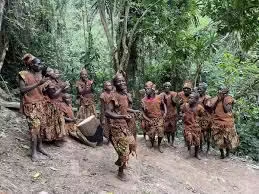BATWA PEOPLE

Fascinating facts about the Batwa people: the Batwa people continue to demonstrate resilience in the face of numerous challenges, from environmental displacement to societal marginalization.
Their enduring culture offers profound insights into human adaptability, spiritual connection with nature, and the importance of preserving indigenous heritage in the modern world.
The Batwa people are native inhabitants of the Bwindi Forest, where they have lived for many years.
A jouney to the impenetrable forest to learn about the Batwa people’s culture and social being and other numerous attractions out there.
Among numerous groups in Uganda, the Batwa people hold a small fraction of the total population and have unique facts about them, as detailed below.
Fascinating Facts about the Pygmies (Batwa People).
Ancient Origins and Unique Genetic Traits
Genetic studies suggest that the Batwa are one of the oldest ethnic groups in Africa, with some estimates placing their lineage at around 70,000 years.
This makes them among the most ancient communities on the continent.
The term “Pygmy” generally refers to groups characterized by shorter stature, typically under five feet for adults, which is thought to be an adaptation to their forested environment.
Deep Knowledge of the Forest facts about the Batwa people
The Batwa people are renowned for their knowledge of the flora and fauna of Central African forests.
Their survival relied on identifying edible plants, tracking animals, and utilizing forest resources for medicine, clothing, and shelter.
Even today, the Batwa have extensive ecological knowledge that surpasses that of many scientists, providing valuable insights into rainforest ecosystems.
Spiritual Connection to the Land and the Batwa People.
The Batwa traditionally practiced animism, viewing the forest and its inhabitants as interconnected parts of a spiritual ecosystem.
Many Batwa rituals and ceremonies involve offerings to forest spirits, honoring the land they see as sacred.
Despite their forced displacement, many Batwa still seek opportunities to perform rituals in their ancestral forests, striving to maintain their spiritual connection.
Challenges with Modern-Day Integration
Forced removal from the forests without compensation or support led to widespread poverty, homelessness, and social exclusion for the Batwa.
While some have adapted to agriculture and other modern practices, many still face discrimination and live as marginalized communities.
A significant portion of the Batwa lacks land rights and citizenship in countries like Uganda, complicating their access to public services and educational resources.
Tourism as a Path to Empowerment
In recent years, cultural tourism has become an important source of income for the Batwa.
Projects like the Batwa Cultural Experience and eco-tourism initiatives offer tourists a chance to learn about Batwa culture while providing economic benefits to the community.

